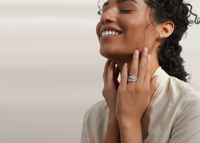In the midst of all the stress of planning your wedding, the last thing you need to worry about is the environmental and social impact of your rings
This year is the year for weddings. After two and a half years of pandemic uncertainty, we can finally feel confident that our big days are going to happen—at last!
But picking out an engagement ring and then wedding bands is no small feat. It takes incredible thought, planning and budgeting, especially if you want your ring to check all the sustainability boxes.
Unfortunately, not all rings are made equal. The industry’s mining techniques for diamonds and gold have been exposed as extractive and consumptive without regard for the ecosystems and communities they tear apart. The mining of precious metals has caused widespread deforestation, soil erosion and displacement of local communities, where miners are denied fair wages and health and safety protocols.
Thankfully, there are ways to mine diamonds in a sustainable way, or in ways that minimize environmental impact. There are also companies that work to restore and protect habitats and ecosystems that have been affected by the industry. Places like Namibia and Botswana have been successful in implementing environmental safeguards in their diamond mines, and the Canadian Arctic (and its fragile ecosystem) has also been heavily regulated to protect the surroundings.
In many places where local ecosystems seemed beyond repair, communities have worked to fill the mining pits, bring back native species, and replace lost topsoil. We haven’t hit the point of no return, so it’s important that we remember when we are purchasing items (even when ethical or sustainable), that we consume less resources in general in order to keep protecting these lands.
With so much on your plate, it can seem like an added task to think about the sustainability and ethical practices of your ring, but it’s well worth it. Ethical engagement rings have a low impact on the environment while also paying people a fair wage. Along with the eco-bonuses, consciously made rings are known to be gorgeously unique and timeless (something you’d want for your ring anyway). The price point isn’t far from what you would see for a “traditional” ring either, so there’s no harm in branching out and checking what your environmental options are. Photo by Edgar Soto on Unsplash
Photo by Edgar Soto on Unsplash
What to look for in your ring?
- Look for vintage first: Items that have already been created and exist in the world are the most sustainable option. Scour Etsy or your grandma’s collection and see if there’s anything that suits your style.
- Make one out of natural or recycled materials: Ask a local crafter to see if they would make you an engraved ring out of wood or bamboo. You could use reclaimed wood, branches, and other recycled materials to create a truly unique band.
- Reach out to sustainable brands: Many companies will claim that they have ethical or sustainable options, but as we know, those tend to be common greenwashed buzzwords. The best way to find out if your ring is truly well-made is to ask your maker.
- See if a lab-grown ring is for you: Research has shown that the environmental impact is significantly less than that of a mined ring, and the cost checks out too. It’s still worth looking into the pros and cons, but for now they seem to be safer, healthier and more sustainable.
Some notable sustainable and ethical ring shops Clean Origin
Clean Origin
- Melissa Joy Manning: All diamonds sourced are certified by the Kimberley Process as conflict-free, they buy from reputable domestic companies, or when buying from abroad, they buy from the mine owners themselves.
- Taylor & Hart: They have eco-friendly lab-grown diamonds as well as traditionally-mined diamonds which are traceable and sourced ethically. They also offer fair trade or recycled metal for your ring.
- Clean Origin: This company sells 100 percent thoughtfully designed lab-grown diamond rings with a focus on being environmentally conscious along with adopting ethical practices. There are many misconceptions about lab-grown diamonds, but their properties are just as real as the others, just without the destructive mining and muffled ethics. The only difference is in their production.
- AUrate New York: Their minimalist design is one draw, but their use of 100 percent recycled gold is the real benefit. Their ethically sourced diamonds come from mines which run under strict ethical and safe working conditions, their pearls are sustainably cultivated on family farms, and they give back to their local communities too.
- Bario Neal: This woman-owned company uses traceable gems, reclaimed metal, and Fairmined-certified gold to bring stunning heirloom quality rings. Their rings are made to tell a story, celebrate a moment, and to create or carry on tradition, and they do it with a commitment to the earth and its people.
There is a surprising amount of sustainable and ethical wedding ring shops that have surfaced in the last decade, and we love to see it. It’s amazing to finally have companies who care about the quality of their product, the happiness of their customers, and who make a commitment to the planet at the same time. Hopefully, this makes your ring hunt a little easier—and a little bit greener!

